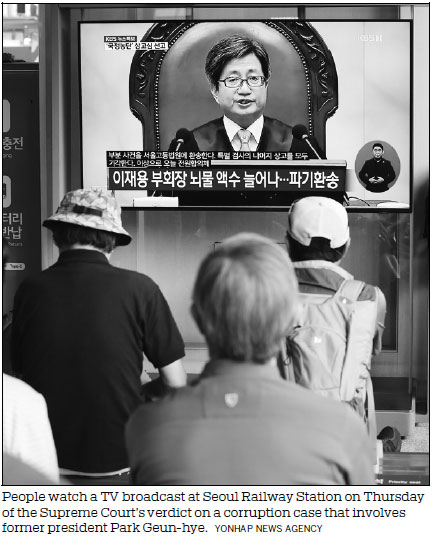Retrials ordered for Park, Samsung heir
S. Korea's top court orders review of ruling on ousted president's bribery case
SEOUL - South Korea's top court on Thursday sent back jailed ex-president Park Geun-hye's corruption case to a lower court. There will be a separate trial on the bribery charges for which she has already been convicted. A ruling could increase her already-lengthy prison term.
The country's first female president was impeached by lawmakers in December 2016 and officially removed from office in March 2017 over a scandal that triggered months of street rallies involving millions of people.
An appellate court last year sentenced Park to a collective 25 years in prison after convicting her of bribery, extortion, abuse of power and other charges. That was an extension of a 24 year prison term set by a district court, which also handled Park's charges together.
But the Supreme Court has now ordered the Seoul High Court to deal with Park's bribery charge separately from other charges, based on a law pertaining to a president or other elected officials, even when the alleged crimes are committed together.
Local media reported that Park could face a lengthier prison term because the courts handling a case with multiple charges typically don't impose the maximum sentences for each charge.
Park will remain in jail because the court did not overturn all her convictions but only the charges that it believed required a separate trial. And even in sending back the bribery charges to the lower court, the Supreme Court did not sending instructions that the lower court consider she might be innocent.
Park was convicted of colluding with a longtime confidante, Choi Soon-sil, to receive millions of dollars in bribes and extortion from businesses, including Samsung, while she was in office from 2013-16. The two women were also convicted of taking bribes from some companies, including more than 7 billion won ($6.5 million) alone from Samsung.
Park was also earlier convicted of colluding with senior government officials to blacklist artists critical of her government to deny them state assistance programs. Park was also convicted of passing on presidential documents with sensitive information to Choi via one of her presidential aides.
The Supreme Court also ordered the Seoul High Court to start new trials for Choi and Lee Jae-yong, Samsung's billionaire heir, who earlier received a 20-year prison term and a suspended prison term, respectively. Observers said Choi could get an longer prison term and Lee a prison sentence at new Seoul High Court trials.
Suspended prison term
In 2017, Lee, vice-president of Samsung Electronics, was sentenced to five years in prison for providing bribes to Park and Choi in return for a government backing for his attempt to bolster his control over the Samsung group, among other charges. But in early 2018, he was set free after the Seoul High Court overturned some of his convictions and suspended his sentence.
His earlier imprisonment surprised many because South Korean courts had long showed leniency toward crimes by business tycoons. Lee is the only son of Samsung's ailing chairman Lee Kun-hee.
Samsung Electronics released a statement saying it regrets "causing concern to (Korean) people" over the corruption case and that it wouldn't repeat past mistakes. The statement did not include specific comments on Thursday's decision.
"Moving forward, we will fully commit ourselves to our original role as a business so that we do not repeat past mistakes," the Samsung statement said.
Park, 67, has called herself a victim of political revenge. She has refused to attend her trials since October 2017 and didn't attend Thursday's court session.
Park has been embroiled in two smaller scandals which led her to be sentenced to two years in prison for violating an election law and five years in prison for abusing state funds. That meant Park has faced the prospect of serving more than 30 years in prison.
Agencies

(China Daily 08/30/2019 page11)














